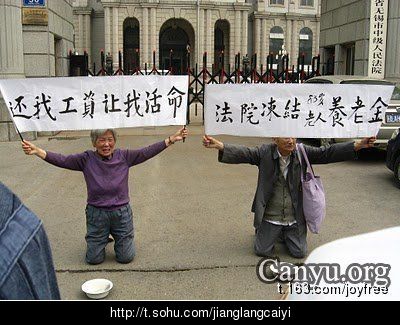“Kneeling country”的版本间的差异
来自China Digital Space
| 第1行: | 第1行: | ||
跪国 (guì guó) kneeling country | 跪国 (guì guó) kneeling country | ||
| + | [[File:kneeling.jpg|3500px|thumb|center|''Two people kneel in front of a courthouse holding signs that read, “Return my wages, allow me to live,” and, “The court has frozen the retirement funds of an 83 year old elderly person.”'']] | ||
| + | Sounds the same as the term 贵国, an honorific term for China meaning “distinguished country” that has previously been parodied as [[expensive country]]. The character 跪 (kneeling) represents the people's subservience to the state. Kneeling in front of a government building or government official is one way to request mercy by sacrificing an amount of one’s dignity. “Kneeling country” is a land in which people feel compelled to kneel to get what they should be entitled to. | ||
| − | + | Here is an example of the terms usage: “People who live in kneeling country have tough lives. They can live without dignity but they can't let the officials lose their dignity. If ordinary people don't kneel their problems won't get solved.” (跪国的老百姓太苦啦,自己可以没有尊严,不可以不让官府没有尊严。老百姓不跪不解决门题呀。) | |
| − | |||
| − | Here is an example of | ||
| − | |||
| − | |||
[[Category: Grass-Mud Horse Lexicon]] | [[Category: Grass-Mud Horse Lexicon]] | ||
2013年9月17日 (二) 21:31的版本
跪国 (guì guó) kneeling country
Sounds the same as the term 贵国, an honorific term for China meaning “distinguished country” that has previously been parodied as expensive country. The character 跪 (kneeling) represents the people's subservience to the state. Kneeling in front of a government building or government official is one way to request mercy by sacrificing an amount of one’s dignity. “Kneeling country” is a land in which people feel compelled to kneel to get what they should be entitled to.
Here is an example of the terms usage: “People who live in kneeling country have tough lives. They can live without dignity but they can't let the officials lose their dignity. If ordinary people don't kneel their problems won't get solved.” (跪国的老百姓太苦啦,自己可以没有尊严,不可以不让官府没有尊严。老百姓不跪不解决门题呀。)





